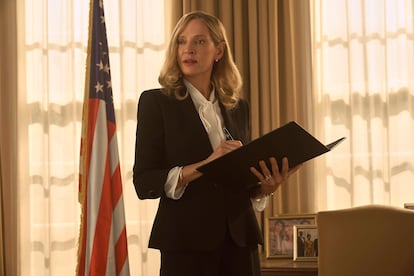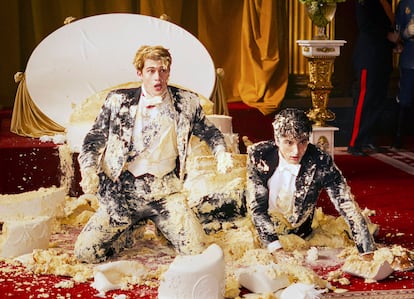In the film ‘Red, White and Royal Blue,’ the US president’s son falls in love with a British prince, begging the question: Can a romantic comedy be transgressive?
Recently released by Amazon Prime Video, the movie is based on an LGTBIQ+ young adult literary phenomenon. Ultimately, it’s a Trojan horse disguised as an innocuous commercial product

-”You’re being idealistic when I need you to be realistic.”
-Is that why you got into politics? To be realistic? Do you really think that’s what people need right now?”
-”I don’t need you to give me a lesson in idealism. My constituents need me to be realistic so they can be idealistic. If you don’t understand that, then you have a lot to learn about politics.”
That could easily be a conversation between two politicians, but in fact the dialogue is between two of the main characters in Red, White and Royal Blue, the gay romantic comedy released a month ago on Amazon Prime Video. Adapted from a literary phenomenon among young audiences (especially the Tik Tok set), this film is directed by Matthew Lopez, a Tony Award-winning playwright. It has been received positively enough by critics and enthusiastically enough among audiences to be considered an apparent hit (what is a hit on streaming platforms, when we never really know how many people watch a movie or a series, nor whether the productions are profitable?). On the Rotten Tomatoes website, Red, White and Royal Blue has 78% positive reviews, and viewers describe it as “entertaining,” “funny,” “adorable” and “refined” and applaud the chemistry of the leading couple, played by Taylor Zakhar Perez and Nicholas Galitzine (although there are some who believe that the movie resembles a soap opera and tends to be formulaic and cloying).
As a straightforward romantic comedy, Red, White and Royal Blue may be just one more in the bunch, and it is not among the genre’s best. But there is something refreshing about the naïve idealism that the film seems to promote. For starters, Ted Malawer and Lopez’s screenplay—based faithfully on Casey McQuiston’s book—imagines an America presided over by a woman who won the 2016 election (which, in the real world, Hillary Clinton lost to Donald Trump). In addition, President Ellen Claremont (played by Uma Thurman) is married to a Mexican immigrant, with whom she has a son, Alex Claremont-Diaz. Mother and son are the ones who have the conversation cited above. When Alex falls in love with British Prince Henry, a story of entanglement and international politics begins, cloaked in the secrecy with which the two boys decide to conduct their transatlantic relationship. But even when they come out of the closet, their experience turns out to be far less traumatic than expected.
President Ellen orders pizza to celebrate her son’s bisexuality, lectures him on the meaning of LGTBIQ+ acronyms, talks matter-of-factly about anal sex, and urges him to take the medication known as PrEP to prevent the spread of HIV. Henry does encounter the predictable misgivings of his brother, the heir to the throne, and his grandfather, the reigning king, but the conflict evaporates as numerous spontaneous demonstrations supporting him spring up across the UK. “I will no longer be the prince of shame and secrets,” Henry says excitedly, looking out at the pro-LGTBIQ+ crowd that has turned up outside Buckingham Palace. The world of Red, White and Royal Blue seems to be more willing to embrace freedom, diversity and progress than the one we inhabit, where many people are still hesitant to come out (if they ever do), especially public figures, be they footballers, singers, actors, politicians or, perhaps, members of a royal family.

But perhaps the most important way this film departs from most others that have portrayed homosexual relationships is in its happy ending. Traditionally, this community has had to settle for love stories that ended badly—often tragically—with examples such as Brokeback Mountain (2005), Disobedience (2017), Call Me by Your Name (2017), Moonlight (2016), Maurice (1987), Boys Don’t Cry (1999) and Weekend (2011). However, McQuiston, and Lopez in the film adaptation, decide that Alex and Henry can indeed end up having a relationship with a future. After all, this love story between a royal and a commoner (who is also American and not white, a gay version of Harry and Megan) is a fairy tale and follows all the rules of the genre, including ending up “happily ever after.”
With the introduction of dissent (up to a point: it’s two normative, wealthy, privileged gay men, after all) into the narratives and archetypes of romantic comedy, Los Angeles Times critic Matt Brennan finds that Red, White and Royal Blue might be considered “transgressive.” “López’s film smuggles queer ideas and images into spaces traditionally populated by straight people and shaped by straight tastes,” he believes. The director—who was the first Latino playwright to win the Tony Award for Best Play in 2021 for The Inheritance—is concerned with details like shooting realistic anal sex scenes and assembling a diverse cast, full of women and non-Caucasians.
This represents another step in a Hollywood trend that is bearing fruit in numerous commercial LGTBIQ+ themed productions, with budgets on the larger side, distributed by major studios and streaming platforms and aimed at mainstream audiences: Love, Simon (2018) and its TV spin-off Love, Victor (2020), Happiest Season (2020), Bros (2022), Fire Island (from 2022, which unjudgmentally and unromantically depicts drug use and sexual practices like the darkroom, which, curiously, can be seen on Disney+) and the series Heartstopper (2022-), another example of an idealistic gay love story based on a literary phenomenon with a huge following, the second season of which just premiered on Netflix. That trend raises the question: can a product be both mainstream and transgressive?
When one thinks of transgression in cinema, names like John Waters, Bruce LaBruce, Da Michael Haneke, Kenneth Anger and Lars von Trier come to mind. Perhaps even Wes Craven in his debut The Last House on the Left, some films by the recently deceased William Friedkin, such as Cruising, and Pedro Almodóvar’s early works qualify. Transgression—that is, the subversion of social conventions, the attack on viewer comfort and the questioning of the status quo—has traditionally been linked to the most underground cinema, with extreme examples such as the Cinema of Transgression movement spearheaded by American Nick Zedd. In his manifesto entitled The Cinema of Transgression, he stated that low-budget cinema had to “go beyond all limits set or prescribed by taste, morality or any other traditional value system shackling the minds of men.” That is to say, transgressing has traditionally meant eating dog poop in the street, showing blood and gore, not shying away from explicit sex and confronting the viewer with uncomfortable moral dilemmas.

But there is another kind of transgression that is subtler, less aggressive and perhaps, sometimes, more effective. Take, for example, Guess Who’s Coming to Dinner, an eminently commercial comedy in which Sidney Poitier and Katharine Hepburn played an interracial couple in 1967, a few months after marriage between people of different races was legalized in 17 states in the United States. Many intellectuals and critics attacked the film for turning the black protagonist into a perfect son-in-law, as if only by being the best at everything could he be accepted by the white family. But Stanley Kramer’s film, clearly a romantic comedy, was a box-office smash in the country, even in the South, where Hollywood studios took it for granted that any production with black main characters would inevitably flop. In parts of the country where systemic racism continues to be a problem in the 21st century, perhaps the gentle tale of an interracial couple and its massive success helped combat bigotry.
Of course, transgression is not at odds with comedy, as many examples attest: Harold and Maude (a 1971 cult film starring a boy and an old woman who form a romantic odd couple); The Sessions (from 2012, in which Helen Hunt played a sex worker who helped a quadriplegic man lose his virginity), Fried Green Tomatoes (which, in 1991, told the tale of an obvious lesbian romance, albeit through subtext, in rural America during the Great Depression) and even Shrek (2001), which started the aughts’ trend of subverting the clichés in children’s stories, telling kids that ogres also fall in love and princesses can stand up for themselves.
At the end of the 1990s, two “stupid American movies,” in theaters at around the same time, were box-office hits precisely because they subverted the puritanical values of American society: There’s Something About Mary (1998) and American Pie (1999). And in television, beyond dense and dark cable shows like The Sopranos (1999-2007) and Mad Men (2007-2015), we had Buffy, the Vampire Slayer (1997-2003), which spoke to a youthful audience about depression, addiction and a taste for sadomasochism, and Desperate Housewives (2004-2012), which made a massive audience fall in love with a bunch of delinquent, vengeful and lying housewives.
Returning to Red, White and Royal Blue: how can such a blank and apparently harmless romantic comedy be transgressive in the middle of 2023? Especially when it was produced by a company founded by one of the world’s richest men, whose workers could not form a union until last year, and whose goal is nothing more than to sell products from its catalog (as the film plays on Prime Video, there’s a button that gives you access to the link to purchase the book on which it is based). Well, we live in a complex world.
Perhaps the transgression of Red, White and Royal Blue lies in the idealism of the film’s none-too-obvious discourse. “Our present idealism is our future reality. It can be,” director Matthew Lopez said in an interview. “I think the only way to create a better world is to first imagine it.” In a world where violence, horror, injustice or grotesqueness do not cause us dread or discomfort because they are constantly before our eyes, on social media, in the news, in the morning magazines, on the streets we walk down, maybe what is really transgressive right now is simply the opposite: kindness, tolerance, freedom—in short, idealism, that is, the ability to dream of a better world. And Red, White and Royal Blue does just that.
Sign up for our weekly newsletter to get more English-language news coverage from EL PAÍS USA Edition
Tu suscripción se está usando en otro dispositivo
¿Quieres añadir otro usuario a tu suscripción?
Si continúas leyendo en este dispositivo, no se podrá leer en el otro.
FlechaTu suscripción se está usando en otro dispositivo y solo puedes acceder a EL PAÍS desde un dispositivo a la vez.
Si quieres compartir tu cuenta, cambia tu suscripción a la modalidad Premium, así podrás añadir otro usuario. Cada uno accederá con su propia cuenta de email, lo que os permitirá personalizar vuestra experiencia en EL PAÍS.
¿Tienes una suscripción de empresa? Accede aquí para contratar más cuentas.
En el caso de no saber quién está usando tu cuenta, te recomendamos cambiar tu contraseña aquí.
Si decides continuar compartiendo tu cuenta, este mensaje se mostrará en tu dispositivo y en el de la otra persona que está usando tu cuenta de forma indefinida, afectando a tu experiencia de lectura. Puedes consultar aquí los términos y condiciones de la suscripción digital.








































